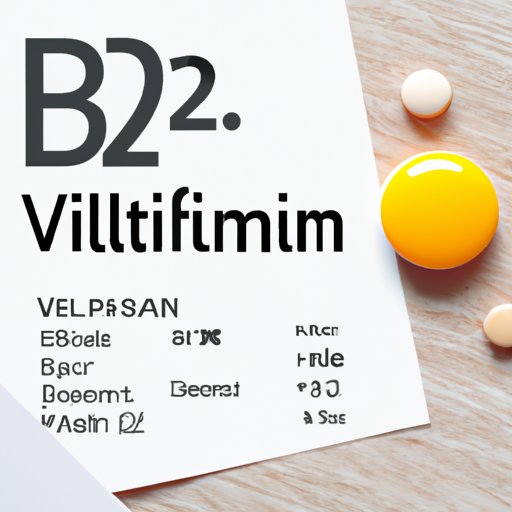
Introduction
Vitamin B12 is an essential nutrient that plays a crucial role in the proper functioning of the body. It is a water-soluble vitamin that is found naturally in animal products, including meat, fish, and dairy. Vitamin B12 is also available in fortified foods and supplements. In this guide, we will explore the various functions of Vitamin B12 and the benefits it offers for overall health and well-being.
The Power of Vitamin B12: How it Supports Your Body’s Functions
Vitamin B12 is involved in various bodily functions, including the formation of red blood cells, nerve function, DNA synthesis, and energy production. Red blood cells are responsible for carrying oxygen throughout the body, and Vitamin B12 helps in their proper formation. This vitamin also helps maintain the health of the nervous system by producing myelin, a protective coating around nerves. Furthermore, it aids in the production of DNA, the genetic material that carries instructions for the proper functioning of the body’s cells.
Vitamin B12 also plays a crucial role in energy production. It helps convert food into glucose, a type of sugar that the body uses for energy. A deficiency in Vitamin B12 can lead to fatigue and weakness, as well as other serious health issues.
Why Vitamin B12 is Crucial for Your Health and Well-being
Vitamin B12 deficiency can lead to a range of health problems, including anemia and neurological symptoms. Anemia occurs when there is not enough red blood cell production in the body, and it can cause fatigue, weakness, and shortness of breath. Neurological symptoms include tingling and numbness in the hands and feet, difficulty walking, and memory problems.
While anyone can develop a Vitamin B12 deficiency, certain populations are at increased risk. Vegetarians and vegans, for example, may not get enough Vitamin B12 from their diets since it is primarily found in animal products. Older adults are also more susceptible to Vitamin B12 deficiency, as the body’s ability to absorb this vitamin decreases with age.
A Comprehensive Guide to Vitamin B12: Benefits, Sources, and Recommendations
Vitamin B12 offers a range of health benefits, including improved cognitive function, heart health, and skin health. Studies have shown that Vitamin B12 may help prevent age-related brain shrinkage and reduce the risk of heart disease. Additionally, this vitamin has been shown to improve the health and appearance of skin by reducing inflammation and redness.
Vitamin B12 is primarily found in animal products, including meat, fish, and dairy. It is also available in fortified foods such as breakfast cereals and plant-based milk alternatives. Supplements are also available and can be taken orally or through injections. While the recommended dietary intake varies based on age and gender, most adults need around 2.4 mcg of Vitamin B12 per day.
Boost Your Energy and Brain Power with Vitamin B12: Facts You Need to Know
Vitamin B12 is known for its ability to improve energy levels and cognitive function. This vitamin helps convert food into glucose, which the body uses for energy, and studies have shown that it may improve fatigue and mood. Vitamin B12 has also been shown to enhance brain function and memory, making it an essential nutrient for maintaining brain health and preventing cognitive decline.
While many people can get enough Vitamin B12 through their diets, some may benefit from taking supplements. Vitamin B12 supplements are available in various forms, including pills, capsules, and injections. However, it is important to talk to a healthcare provider before starting any new supplement regimen.
Vitamin B12 Deficiency and Its Effects on the Body: Symptoms, Causes, and Treatment
Vitamin B12 deficiency can have serious consequences for the body. Symptoms may include fatigue, weakness, tingling and numbness in the hands and feet, and memory problems. Causes of Vitamin B12 deficiency can include a lack of dietary intake, poor absorption due to digestive issues, and certain medical conditions such as pernicious anemia.
Treatment for Vitamin B12 deficiency typically involves dietary changes, including increasing intake of animal products or taking supplements. In severe cases, Vitamin B12 injections may be necessary. If left untreated, Vitamin B12 deficiency can lead to irreversible neurological damage.
The Role of Vitamin B12 in Maintaining a Healthy Immune System and Preventing Diseases
Vitamin B12 has been shown to play a role in immune function, with studies suggesting that it may help boost the body’s natural defenses against infections and illnesses. Additionally, this vitamin may help prevent certain chronic diseases, including heart disease. Research has shown that higher levels of Vitamin B12 may be associated with a lower risk of heart disease, though more studies are needed to confirm this.
Conclusion
Vitamin B12 is a crucial nutrient that plays many important roles in the body. It helps maintain healthy red blood cells and nerve function, supports energy production, and promotes overall health and well-being. While Vitamin B12 deficiency can lead to serious health problems, it is easy to prevent with dietary changes and supplements. By ensuring adequate intake of Vitamin B12, you can reap the many benefits this vitamin has to offer.




